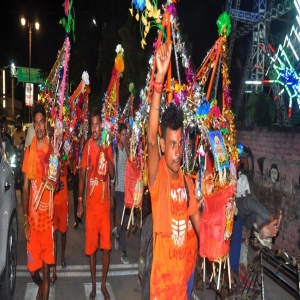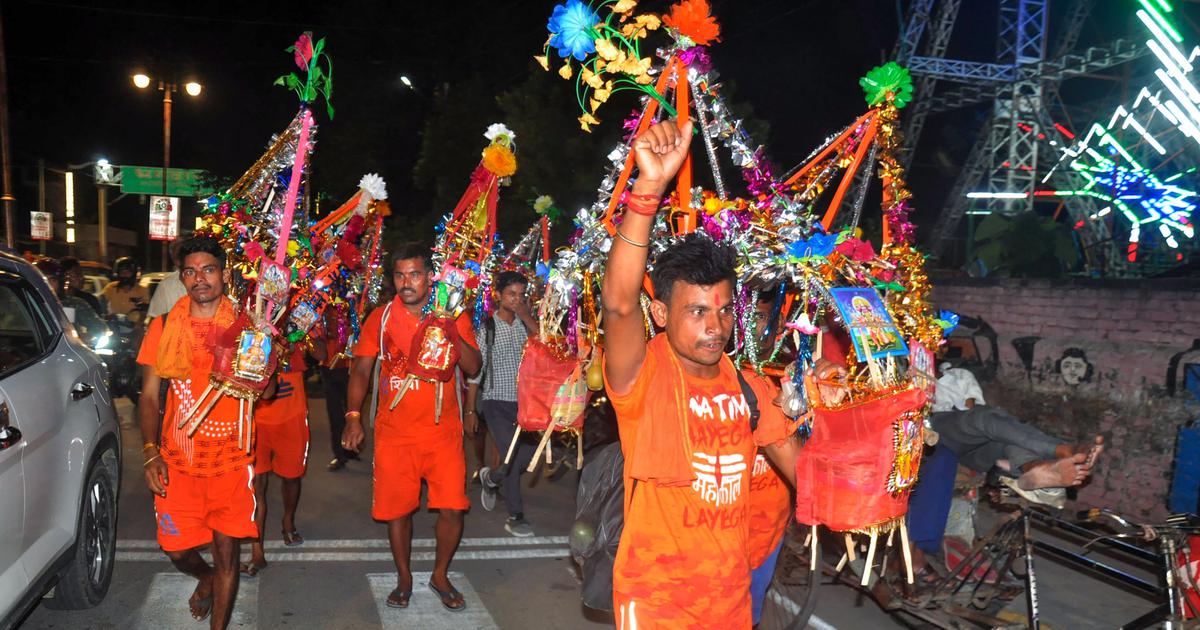
.jpg) Dr. John Singarayar
Dr. John Singarayar

A contentious discussion has been triggered by the Uttar Pradesh (UP) government's decision to expand the order requiring restaurants along the Kanwar Yatra route to post the names of their owners throughout the state. This edict, first put into effect by the Muzaffarnagar police, has been widely criticised by civil society, opposition parties, and even some members of the ruling alliance.
According to an order issued by the Muzaffarnagar police, the district's restaurants along the Kanwar Yatra route are required to post the names of their owners on their signs. The stated goal of this instruction was to supposedly avoid any "confusion" among the kanwariyas, or pilgrims, taking part in the Yatra. The district police chief, Abhishek Singh, claims the action was intended to ensure no law-and-order issues during the Yatra. Singh stressed that all participating restaurants voluntarily adhered to the instructions.
Every year, a large number of Shiva devotees, called kanwariyas, go to northern India for the Kanwar Yatra to gather water from the Ganges River and offer it at Shiva temples. Several restaurants along the road serve these pilgrims. The intention behind the requirement to post the names of the proprietors was supposedly to assist kanwariyas in recognising and avoiding restaurants that do not fit their dietary requirements, particularly those looking for "satvik" or pure vegetarian food.
Several groups, including opposition parties and members of the ruling alliance, have strongly criticised the decree. One of the main opposition parties, the Congress party, has claimed that the directive seeks to legitimise the boycott of Muslims in the marketplace. Pawan Khera, a spokesman for Congress, called the directive "state-sponsored bigotry." Asaduddin Owaisi, the president of AIMIM, compared the edict to both Apartheid and the Judenboykott, which was the boycott of Jewish-owned companies in Nazi Germany.
Chirag Paswan, a union minister and BJP supporter, vehemently objected to the directive, saying he would "never support or encourage any divide in the name of caste or religion." Another BJP ally, the Janata Dal-United (JD-U), also opposed the instruction, with leader KC Tyagi cautioning that it would cause intercommunal strife and pushing for its withdrawal.
Former Union minister and BJP senior leader Mukhtar Abbas Naqvi voiced worries that the directive would continue the "disease of untouchability." Presidents of the Samajwadi Party and Bahujan Samaj Party, Akhilesh Yadav and Mayawati, respectively, denounced the action in the meanwhile. Yadav referred to it as a "social crime" and urged the courts to take suo motu notice, while Mayawati demanded that it be withdrawn.
The BJP has defended the proposal in spite of strong opposition. Party spokespeople contend that the policy respects their dietary customs by assisting fasting Hindus in locating restaurants that only provide vegetarian fare. In support of the order, VK Mishra, the head of Meerut's weights and measures department, cited the Food Safety and Standards Act, 2006, which mandates that eateries and dhabas show the name of the business, the name of the owner and the license number.
The Muzaffarnagar directive's wider socio-political ramifications are a major source of concern with its implementation throughout Uttar Pradesh. Many people interpret the action as an attempt to formally establish communal and religious segregation in business dealings. This command may deepen societal rifts already present and promote mistrust and discrimination.
The decision is most likely to have an immediate effect on Uttar Pradesh's intercommunal relations. The rule inadvertently promotes the identification of enterprises based on the religious connections of their owners by requiring the display of the owners' names. Such actions can easily result in increased mistrust and hostility amongst communities in a state where communal conflicts have a history.
The criticism from the opposition draws attention to how the command can incite violence inside the community. The directive may encourage boycotts or even attacks against the restaurants owned by Muslims by indicating to kanwariyas which ones they should avoid. The Judenboykott parallel is especially striking because it highlights the risks associated with state policies that discriminate against certain communities in the name of public safety or order.
Economic discrimination is another issue that the directive brings up. Due to the order's requirement that companies disclose the owners' religious affiliations, there may be a de facto economic boycott of institutions owned by Muslims. The Indian Constitution's tenets of equality and non-discrimination are also compromised, in addition to endangering the lives of Muslim traders.
Religiously motivated economic boycotts are a kind of collective punishment that disproportionately harm communities of colour. These actions have the potential to economically isolate these communities, escalating already-existing socioeconomic divides and igniting animosity and strife.
It seems flimsy that the Food Safety and Standards Act of 2006 is the basis for the order. The Act requires some information to be displayed for consumer safety and openness, but expanding this requirement to include business owners' religious affiliations is outside the Act's purview. Abusing regulatory provisions to advance communal agendas gives rise to grave legal and ethical concerns.
Furthermore, it may be argued that the directive's implementation violates the Constitution's guarantees of the right to privacy and the freedom to practice one's profession. Equal treatment under the law and secularism are also violated when particular communities are targeted by such actions.
The command needs to be interpreted in light of Uttar Pradesh's and India's larger historical and socio-political backgrounds. Historical communal violence and tensions in the state are well-documented, and they are frequently made worse by political rhetoric and legislation that take advantage of religious differences to win votes.
Though controversial, the analogy to Apartheid and the Judenboykott highlights the perils of officially sanctioned discrimination. The long-term social and moral ramifications of policies that target minority communities and practice economic segregation are aptly illustrated by historical examples. The regulation has the potential to institutionalise prejudice against Muslims, a practice that is reminiscent of earlier instances in which the state has oppressed and marginalised particular populations.
The BJP's ideological position, which frequently highlights Hindu cultural and religious identity, is reflected in its defence of the directive. This is consistent with the party's efforts to broaden the base of Hindu voters who support it, especially in the politically significant state of Uttar Pradesh.
But this tactic comes with a hefty price. By presenting policies that play on religious feelings, the BJP risks escalating societal divisions and alienating communities of color. The adoption of the order may exacerbate divisions among the state's populace and undermine initiatives to promote inclusive growth and community peace.